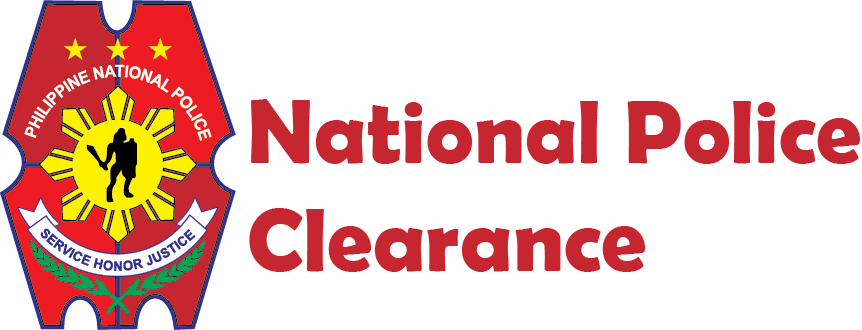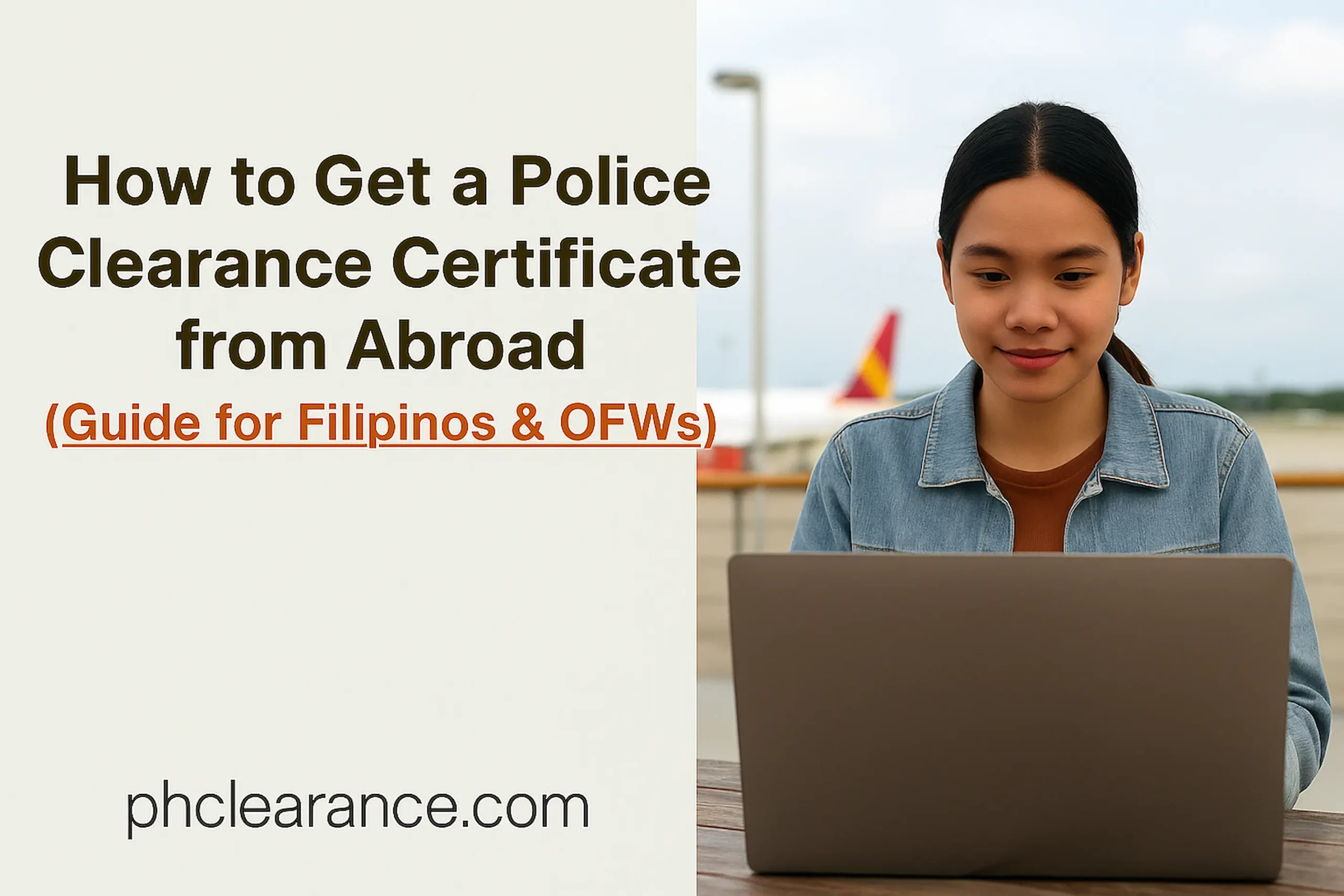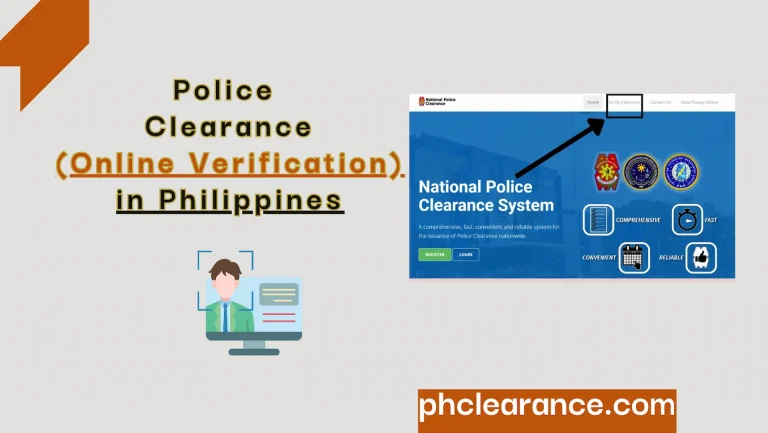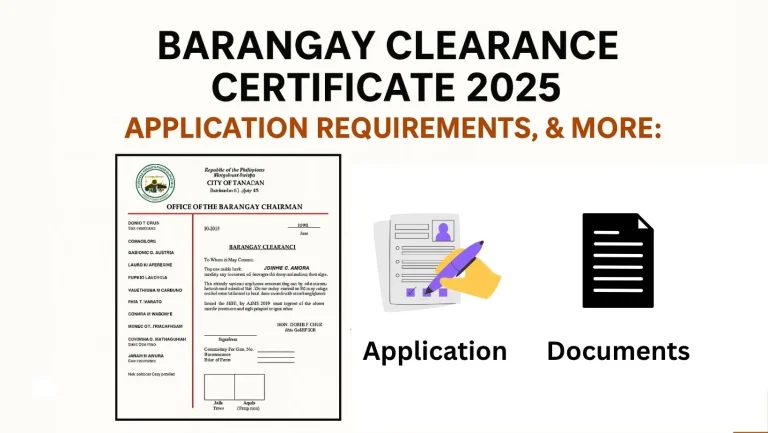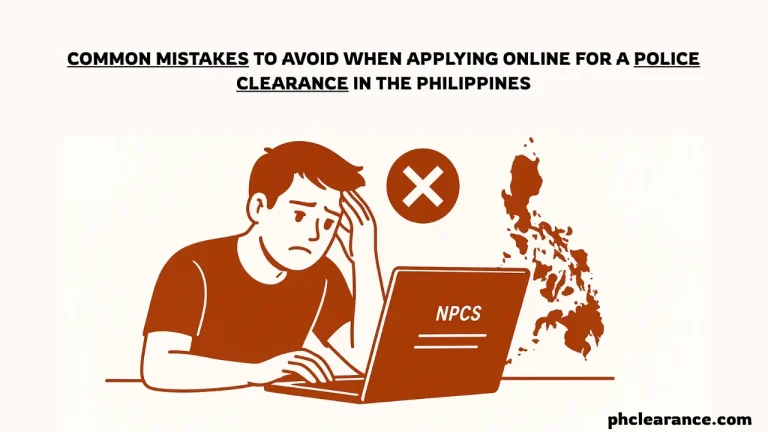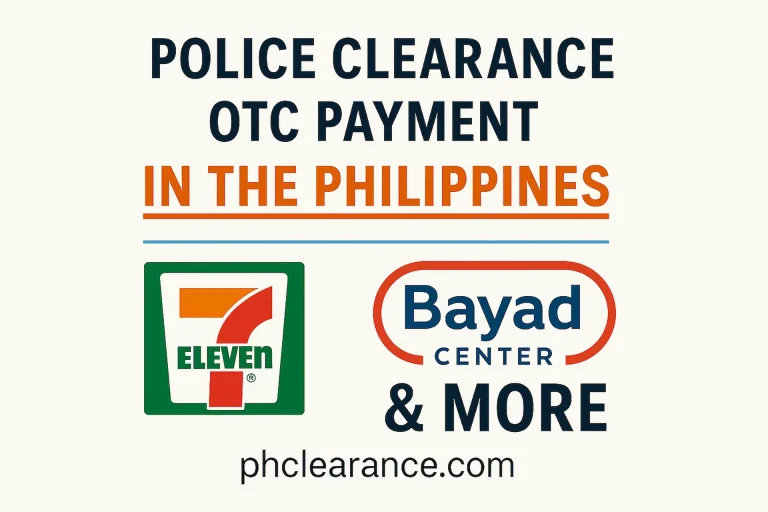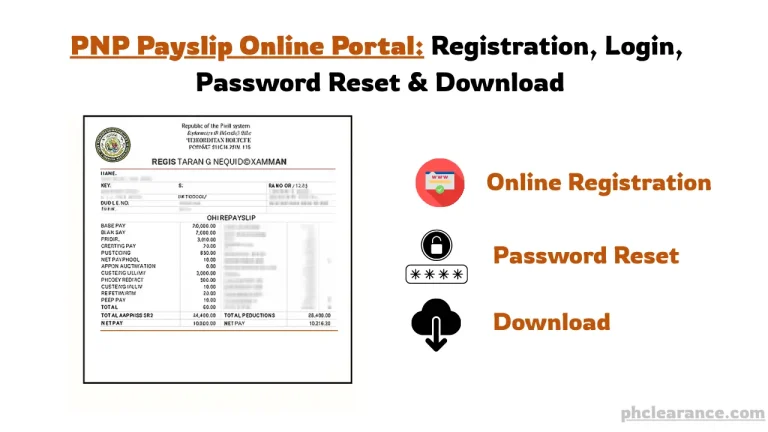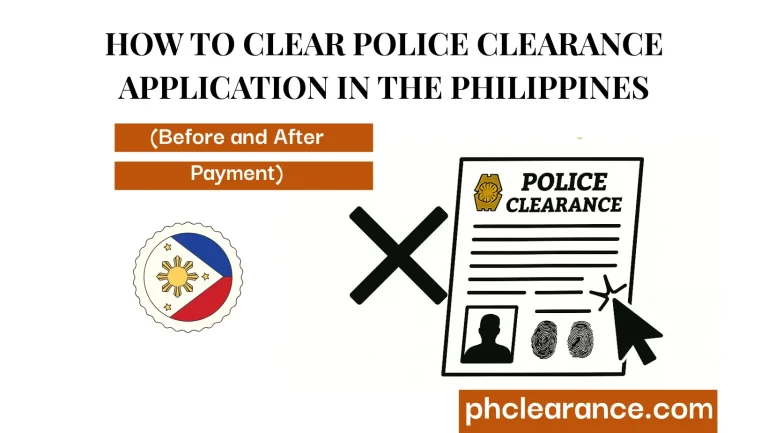How to get a Police Clearance Certificate While Abroad? (Guides for Filipinos and OFWs)
Now, you can get a police clearance certificate from abroad if you are a Filipino living abroad or an OFW (Overseas Filipino Workers).
Getting a police clearance while you are abroad may feel complicated, but there are now several reliable ways to secure one. You can obtain a police clearance through the Philippine Embassy or Consulate, or by using the PNP’s Clearance Certification option for overseas and special applicants. For those who specifically need an NBI Clearance, there are also two official methods available for Filipinos abroad.
In this article, you’ll learn the step-by-step process for each option, explained in simple terms with attached screenshots, so you can easily follow along and complete your application successfully.
What is a Police Clearance Certificate?
A police clearance certificate is an important document in the Philippines issued by the Philippine National Police(PNP) or the NBI clearance issued by the National Bureau of Investigation (NBI) that confirms a person has no criminal or unlawful record.
It is often required for job applications, immigration, visa processing, and other official matters.
Who Needs a Police Clearance Certificate From Abroad?
The following individuals will need a police clearance certificate from abroad:
- OFWs(Overseas Filipino Workers) who are applying for jobs abroad.
- Filipinos who are immigrating to another country or are already residing in another country.
- Students or residents applying for visas.
- Filipino Individuals who need to verify their criminal record status.
Process for Getting a Police Clearance Certificate from Abroad:
To know about the process of getting a police clearance certificate abroad (or in the country you are currently in), you need to find the issuing authority and the required documents necessary for the application process.
Identify the Issuing Authority:
First, you need to find out who will be the issuing authority in your case. In case of police clearance, there are three issuing authorities:
PNP(Philippines National Police):
If you need PNP/National police clearance, the PNP issues this certificate. This process is entirely online.
Philippines Embassy or Consulate:
If the Philippines Embassy or Consulate provides this facility in the country, you will need to contact them for the police clearance application process. Most embassies offer this facility, which has made the application process easier for Filipinos.
NBI Platform:
NBI clearance is mostly used internationally. It is like a police clearance certificate. Individuals and agencies prefer it for visa applications and international travel.
Besides, if you had an NBI clearance and visited another country, and you needed to renew it, you can get a renewal easily while staying in another country.
Gather the Required Documents:
For identification and verification, you will need to provide a set of documents. It may include the following:
Proof of Identification:
This can be any valid government-issued ID, such as a passport or driver’s license.
Proof of Citizenship:
Submit a document that confirms you’re a Filipino citizen, like your birth certificate, Philippine passport, or a barangay certificate.
Proof of Residency:
Provide evidence of your current address, such as a utility bill, bank statement, or any official document that lists your place of residence.
Application Form:
There is a unique application form for every embassy/consulate or police station. You need to get a form, either download it from your concerned embassy or consulate website, or get it by personally visiting it, and fill it out correctly and completely.
Photographs:
Passport-size photographs are also necessary for the application process. It is advisable to bring photos of yourself to avoid any delay in the application process.
Biometric Data:
Biometric data, fingerprints, is also a compulsory requirement for the application process. It is usually done during a personal visit to the embassy, consulate, or in a local police station in the country where you are residing. (not in the Philippines)
Options for Getting a Clearance Certificate While Abroad:
There are four ways to get a clearance certificate while abroad (outside of the Philippines) if you are a Filipino or OFWs:
- Getting from the Philippines Embassy or Consulate while abroad.
- Getting it online from the PNP’s official website.
- Get an NBI clearance while abroad from the Philippine Embassy or Consulate.
- Get an NBI clearance while abroad through a representative in the Philippines.
Getting a Police Clearance Certificate While Abroad:
There are two methods to get the police clearance. Here, we will discuss the both methods step-by-step.
Method 1. Getting a Police Clearance Online via PNP’s Official Website.
For overseas Filipinos, bedridden individuals, petitioners, and even relatives of the deceased, the PNP provides a Clearance Certification option directly through its official online portal. This method allows you to apply entirely online by registering, logging in, and uploading the required documents, without the need to visit a police station in person.
On successful verification, you can download your clearance certificate online. Here is how to get a police clearance online via PNP website while abroad.
Step 1. Online Registration through the NPCS Website:
First, you need to do the online registration through the NPCS official website. Once registered, log in to your account and complete your profile by providing all the required details. We have already covered this process in detail with attached screenshots. You can learn about it in Online Registration through the NPCS(National Police Clearance System) Website
- Go to the PNP’s official website.
- Click on the Register button for first time registration.
- Complete the verification of the registration process.
- login to your account by providing your registered email and password.
- Complete your profile details.
Step 2. Apply For Clearance Certification:
When you log in to your account, you will get the page below. Click on the Clearance Certification button.
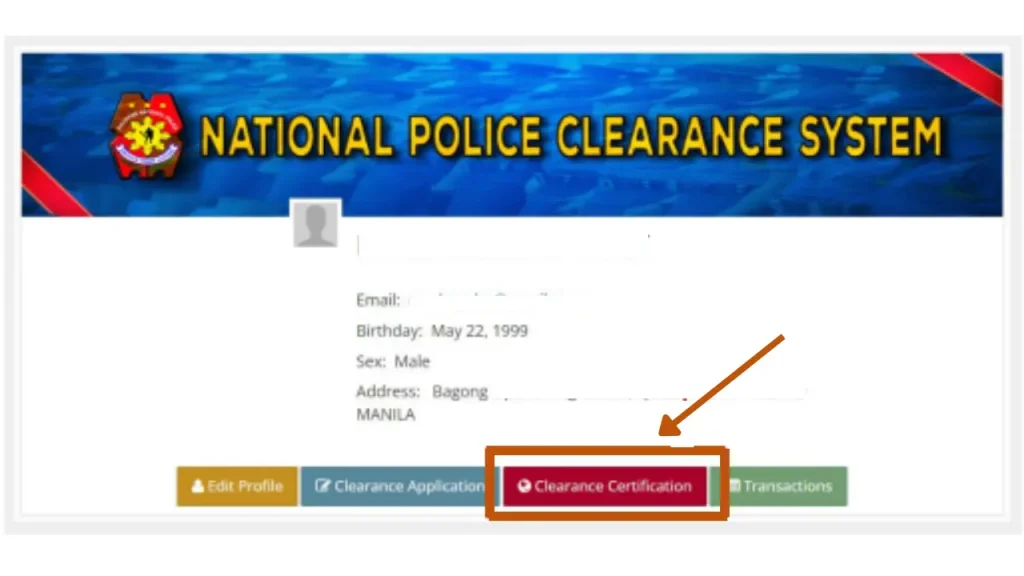
Step 3. Selection of a Specific Category:
Clicking this button will take you to a dedicated section with four categories:
- Filipino citizens working or residing abroad.
- Bedridden applicants. Applicants with serious medical conditions who are physically unable to appear in person.
- Petitioners (applying for probation). Such type of applicants cannot appear in person due to legal or custodial restrictions.
- Deceased individuals (application filed by relatives): Allowing relatives to complete the process online, especially in urgent legal, immigration, or estate matters.
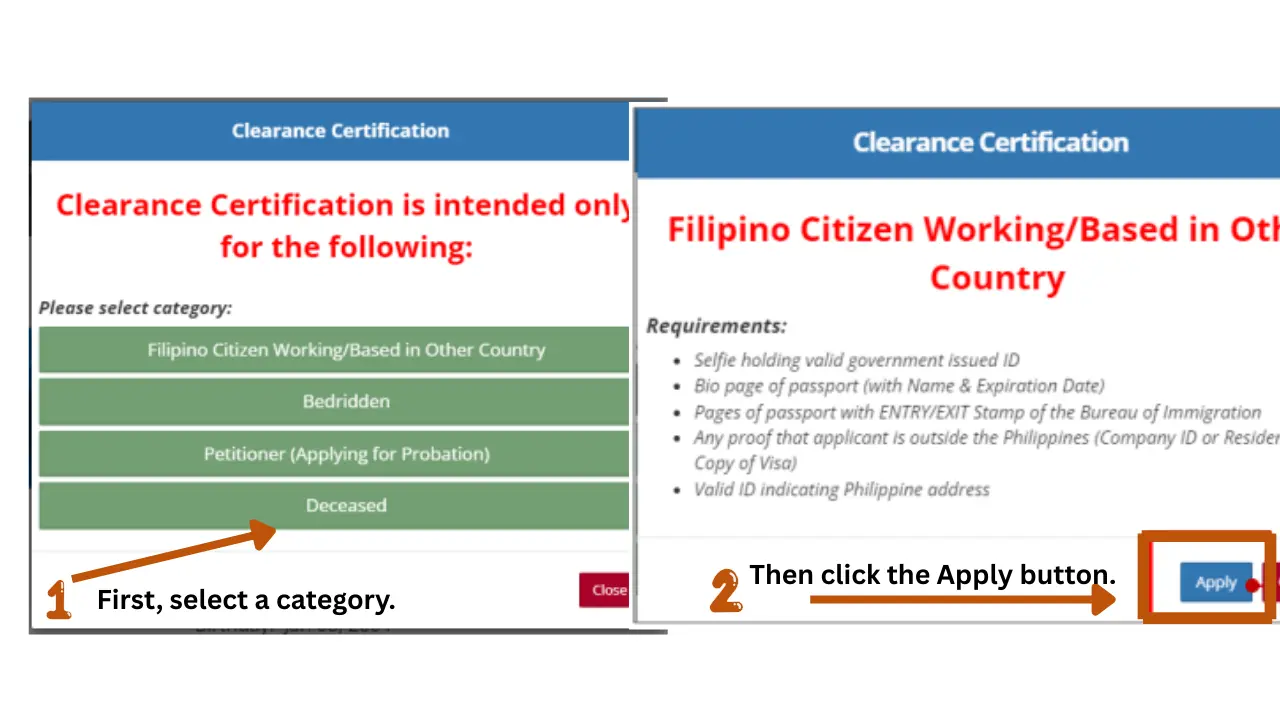
Choose the appropriate category that matches your situation or purpose. Here, we will select the Filipino Citizen Working/Based in Other Country option.
Step 4. Mention Purpose of Application and Current Address:
Select the Filipino Citizen Working/Based in Other Country option and then click the Apply button to get to the next step.
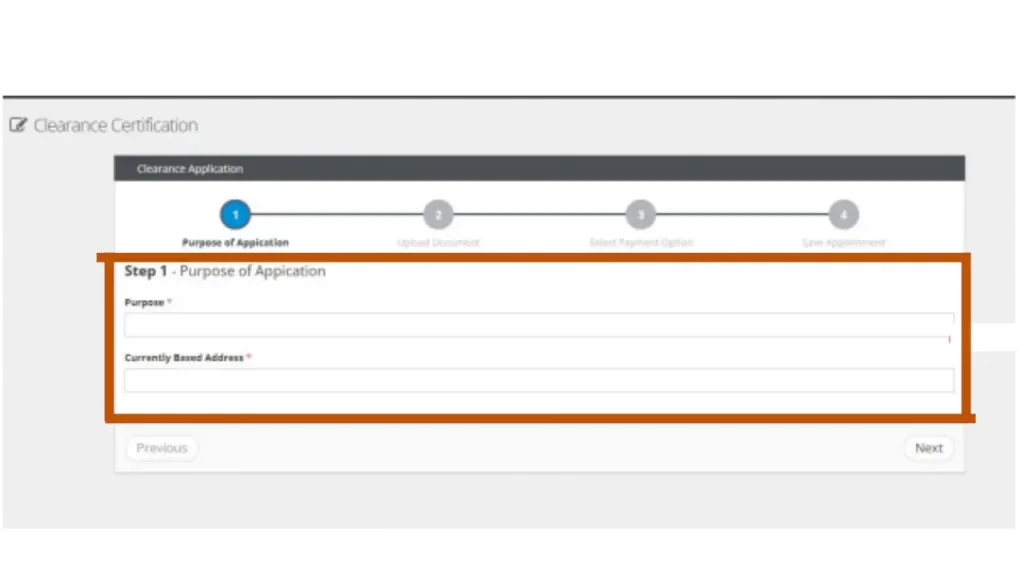
Provide the purpose of getting the clearance certificate and also provide address of your current location. Then click the Next button to get to the uploading documents step.
Step 5. Upload Required Documents:
You will be asked to upload a set of documents. It depends on the selection of the specific category. Each category has its own set of required documents. Here, we are discussing the method for securing police clearance certificate for overseas Filipinos. Required documents include:
- A selfie of yourself holding a valid government-issued ID in your hand.
- A photocopy of your passport bio page showing your name and expiry date.
- Pages of your passport with the entry/exit stamps of the Bureau of Immigration.
- A document that proves you are outside the Philippines. It should be any of the following:
- Company ID
- Resident ID
- Copy of VISA
- A valid ID that shows your address in the Philippines.
Take a clear picture of the above required documents and keep them separately in PDF files. The file size must be less than 2 MB.
Upload a photo and picture(selfie) of yourself holding a valid ID in your hand.
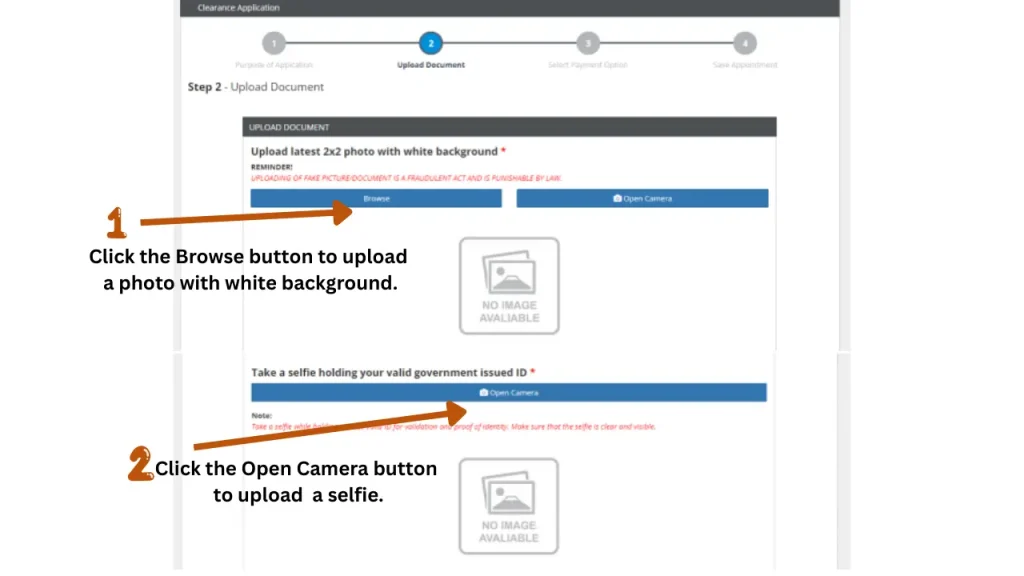
Click the Browse button, locate and select the pdf file having your photo to upload it here. Then click the Open Camera button to upload a selfie of yourself holding a valid ID in your hand. Once uploaded, it will be displayed below. Make sure that the selfie is clear and visible.
Then upload the other required documents.
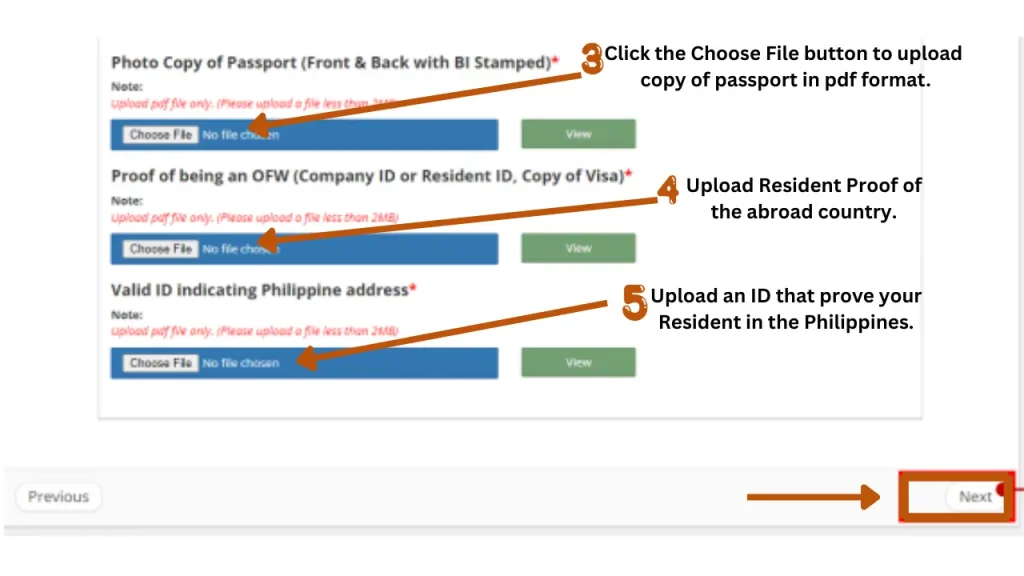
Click on the Choose File option, locate and select the pdf file having the copy of the passport, then the resident proof in the foreign country, and finally the resident proof in the Philippines.
Upload all the five documents one by one. Click the view button to view files and ensure that the files are clear, visible and easy to read. Finally click the Next button.
₱Step 6. Payment Preparation:
The next step is to pay the processing fee for the clearance certificate. In this step, the system will display the fee payment standard amount, which is ₱150.
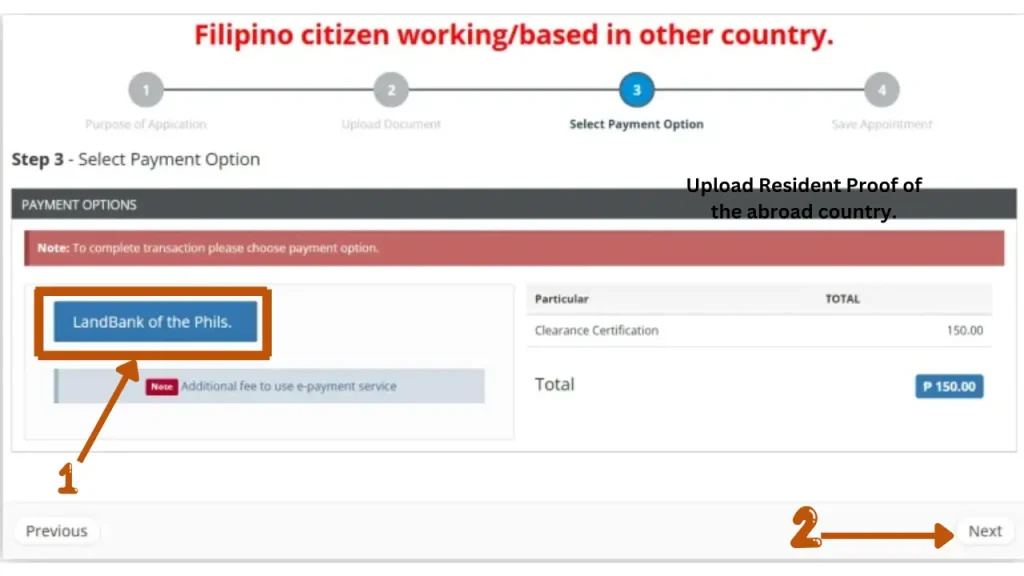
Click on the LandBank of the Phils button, and then click the Next button.
Step 7. Save Appointment:
Finally, click on the Save Appointment button.
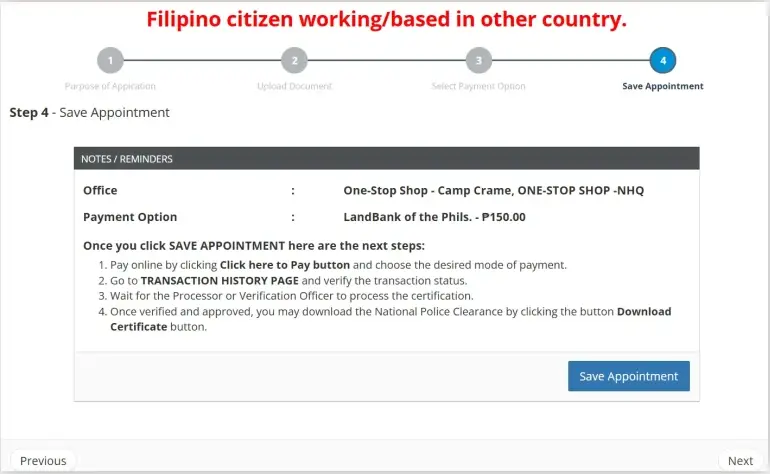
Now, you need to pay the clearance certificate processing fee.
₱Step 8. Pay Clearance Certificate Processing Fee:
When you click the Save Appointment button, you will get the transaction history page. Scroll down the page to get the portion below of the page.
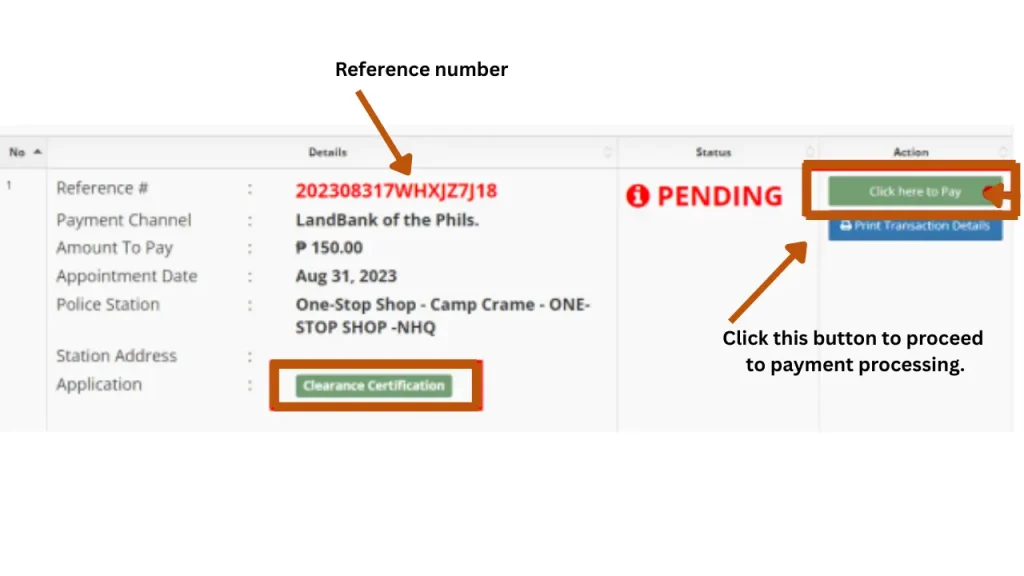
Note down or save the reference number. You will need it for fee payment. You cannot pay the police clearance certificate processing fee without the reference number. Click on the Click here to Pay button. You will be directed to the LBP ePayment portal.
On the home page of the LBP ePayment portal, choose a payment method and follow the onscreen instructions to complete the fee payment process.
You can pay it online through mobile ewallets (GCash, PayMaya, ShopeePay, etc.), Credit or Debit Card, and also through OTC(Over-The-Counter) payment methods like LandBank, Bayad Center, or 7-11 via CLIQQ App or CLIQQ machine.
Step 9. Fee Payment Transaction Verification:
After completing your payment, it’s important to confirm that the transaction was successful. Normally, you will receive a confirmation via email or SMS indicating that the fee has been paid.
However, to be certain, you should log in to your NPCS account and check the Transaction History section. If the status shows “PAID”, it means your payment has been successfully processed.
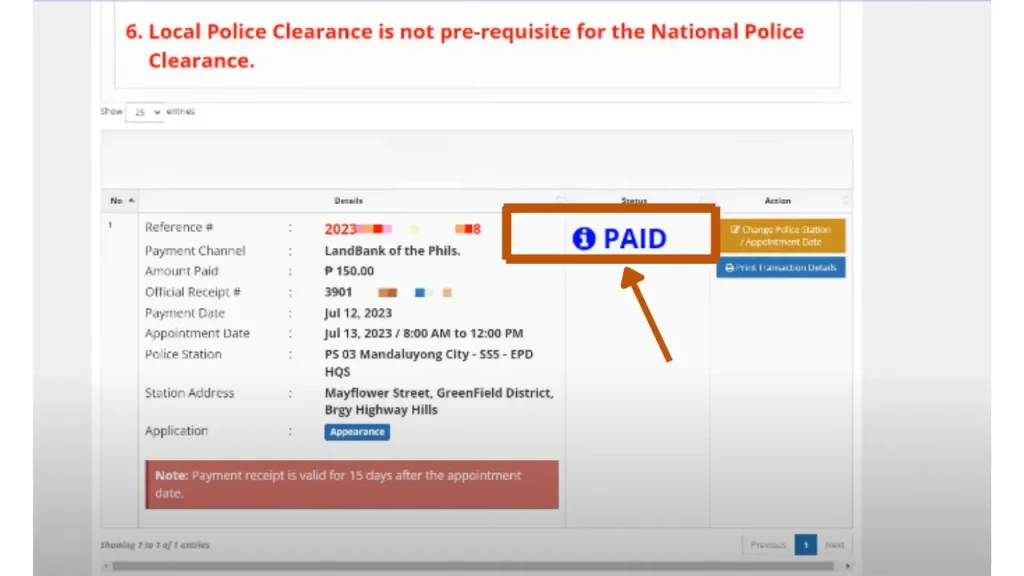
This is important to confirm the transaction. Because after the fee payment, your online application process for the police clearance certificate will be completed. After that, your application will be processed for further verification.
Step 10. Download Clearance Certificate:
If your application is successfully processed and verified, and you don’t have a HIT, you will be able to download your clearance certificate.
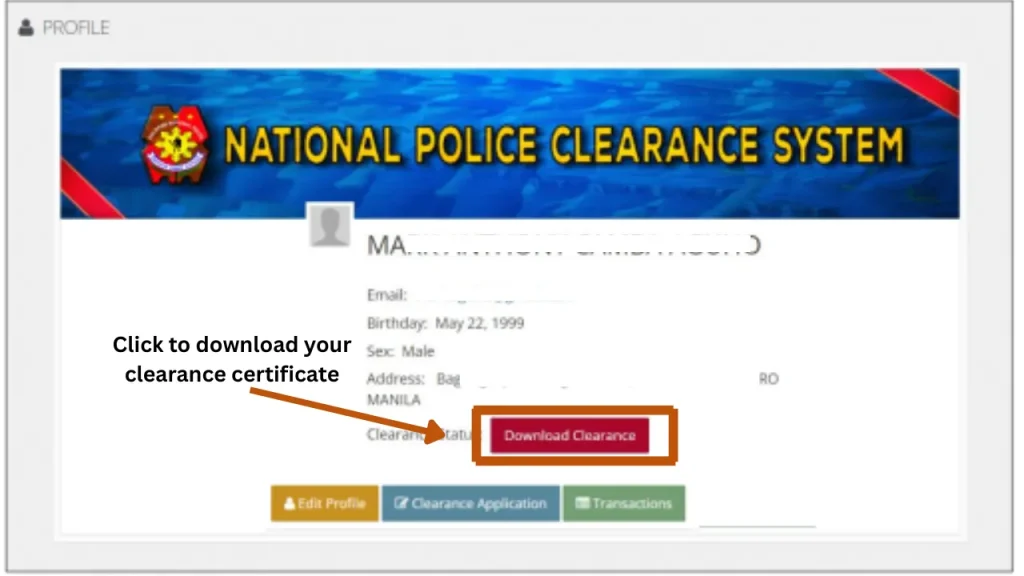
login to your profile and click on the Download Clearance button. Your police clearance certificate will be downloaded. This is how you can apply online for the police clearance certificate on the NPCS website while abroad and download it after successful verification.
Getting a Police Clearance Certificate From Philippines Embassy/Consulate:
If you want to get a certificate while abroad, first find the issuing authority. Find the official website of the nearest Philippine embassy or consulate. Get the information related to the application process for the police clearance certificate from the website.
If there is not enough information on the website or you don’t know how to get the information, simply get the email or phone number from the website.
Contact the authorities through email or phone number and find out all the information necessary for the application process.
For your convenience, we have discussed the possible steps involved in this process one by one.
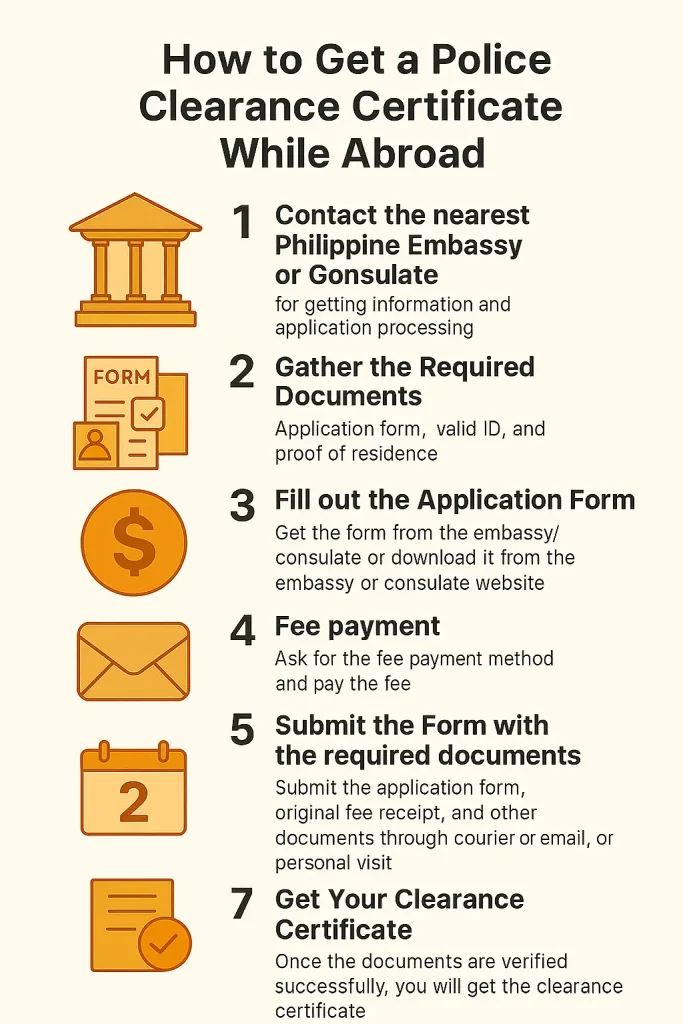
Step 1. Contact the Nearest Philippine Embassy or Consulate:
Almost all the embassies have the same procedure for the application process. The first step is to find out the issuing authority. In the case of living abroad, it is better to find out whether the Philippines embassy or consulate in the country issues this certificate or not.
The easiest method is to take contact details online from the official website and find out whether the embassy or consulate issues it or not.
Most of the embassies or consulates in other countries provide this facility to Filipinos. Get as much information as you can for the application process of the police clearance.
Step 2. Gather the Required Documents:
First, you must ensure you have all the required documents ready. The most common documents needed include:
Application Form:
It is a PCC form that you can download from your concerned Philippines embassy or consulate’s official website. You can also get the form from the embassy or consulate’s office. Visit the office and get the form.
Valid ID:
You need a valid ID to prove your identification. It may be a government-issued ID, like a photocopy of your passport.
Proof of Residence:
Any type of document that can act as a valid proof of your residency in the Philippines.
Step 3. Complete the Application Form:
Fill out the form by providing all the required details. Ensure that all the details are correct, updated, and complete.
Step 4. Fee Payment:
Pay the PCC(Police Clearance Certificate) processing fee. Enquire about the payment methods from your concerned embassy/consulate and pay the fee using your preferred payment method.
Step 5. Submit the Application Form with the Required Documents:
Submit the completed application form, original fee receipt, and other required documents to the concerned officer.
You can submit it by personally visiting the embassy, or you can mail it to the embassy. Some embassies also allow online submissions.
Contact your embassy and ask about the possible ways to submit the application form. Submit it in the way that you feel comfortable with.
Step 6. Wait for Processing:
Once you submit your application for the police clearance certificate, it will be processed through a verification process. The verification process will take time, depending on the workload and the rules and regulations of the country. However, you can expect about 2 to 5 weeks for your application to be processed completely.
It’s advisable to apply as early as possible to avoid any inconvenience. Some embassies/consulates also have an online tracking system to track the progress of your application.
Usually, you will get a reference number for your application. Using the reference number, you can track your application status.
You can also enquire about the progress of your application using the official email or phone number of your concerned embassy or consulate.
Step 7. Collecting Your Police Clearance Certificate:
When your police clearance certificate is ready, you can get it through email or by personally visiting the embassy or consulate.
When you get the certificate, check all the details in the certificate. Make sure that all your details in the certificate are correct and complete. In case of any error or issue, contact the embassy immediately.
Option 2. Two Ways to Get an NBI Clearance While Abroad(Through an Embassy or a Representative):
The NBI Clearance certificate is more commonly used for international purposes. Besides, the NBI offers two ways to get the NBI clearance while abroad for Filipinos and OFWs. The two ways include:
- Getting an NBI clearance through a representative.
- Getting an NBI clearance through the Philippine Embassy/Consulate.
We will discuss both methods step by step. But first, let’s discuss the possible documents required for the application process for the NBI clearance while abroad.
Requirements for the NBI Clearance While Abroad for Filipinos and OFWs:
You will need the following documents as a prerequisite for the NBI clearance while abroad:NBI
Clearance Application Form(Form No. 5):
You can get a copy from your nearest Philippine embassy or consulate. Your representative can also ask for it from the Mailed Clearance Section in the NBI Main Office.
Validated Fingerprints:
Your fingerprints are necessary for the application process. You can get it at the Philippine Embassy or Consulate.
If the embassy is far away or there is any issue, and you cannot go personally to the embassy or consulate, you can ask for an alternative method.
They can direct you to take the fingerprint at the local police station near you. This method is widely used in this case.
Go to the nearest police station(in the foreign country you are currently living in) and ask for the fingerprint service. They will give you a form and will take a rolled impression of your fingerprints. Once taken, make sure that the concerned officer signs and stamps it for authentication.
The police station will charge you a small amount for providing this service to you.
Sample of a Rolled Impression:
You will need a sample of a rolled impression of your fingerprints. You need to do it in front of officer in the Philippine embassy or consulate or in local police station near to you.
This is a sample of the rolled impression. It also shows how to put it correctly.
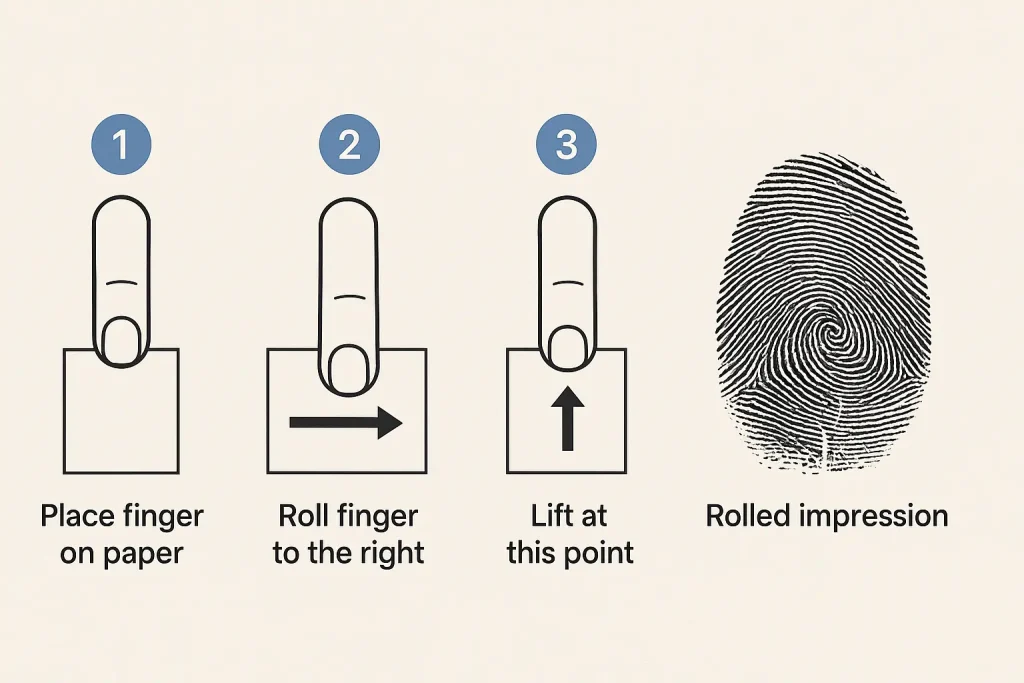
Passport’s Photocopy:
Take a photocopy of your passport. You will need to send it to the Mailed Clearance Section of the NBI Main Office.
2*2 Photographs:
Make sure that you add recent photographs of yourself with the documents.
Additional Requirements if You Want to Process the Application Through a Representative in the Philippines:
If you are going to process your application for the NBI clearance through a representative(a friend or a relative) in the Philippines, you will need the following additional documents:
Special Power of Attorney(SPA):
If you want to process the application through a representative, you will need a SPA(Special Power of Attorney) certificate.
There are three methods to get the SPA certificate:
Method 1. Get a SPA from the Nearest Philippine Embassy or Consulate:
Method 2. Draft Your SPA and Notarize it Locally:
If the embassy or consulate is far away, you can follow this method to get the SPA:
Explanation: (A notary public is someone who checks your identity and watches you sign the paper. After you sign, the notary adds a stamp or seal to prove that it’s really you who signed it and not someone else).
Check your embassy’s website or email them to confirm if they accept documents by mail for consular authentication.
Method 3. Apostille Process(If you are in an Apostille country):
If your country is a member of the Apostille Convention:
📄Note: What is an Apostille Process: An apostille is a certificate that confirms your notarized document is genuine and recognized internationally. It’s like an international stamp that says: “Yes, this document is real and valid — other countries can accept it too.”
Summary:
| Situation | What to do |
| Near a Philippine Embassy/Consulate | Follow method 1. Go in person, get the SPA notarized directly |
| Far from the embassy | Follow method 2. Notarize SPA locally and authenticate via foreign affairs, then mail to the Embassy for the consular seal |
| In Apostille Country | Follow method 3. Notarize locally and get an Apostille – accepted in the Philippines without embassy authentication |
A Valid ID:
It should not be a passport. It should be any government-issued ID, like a driving license or national identity card.
Steps to Get an NBI Clearance While Abroad Through a Trusted Representative in the Philippines:
If the embassy/consulate in your country is far away from you, and it is difficult for you to do the application process for the NBI clearance, or you want a faster method, you can get the NBI clearance in the Philippines through a trusted representative.
This guide is valuable for OFWs or Filipinos in remote areas, or if you want a faster route.
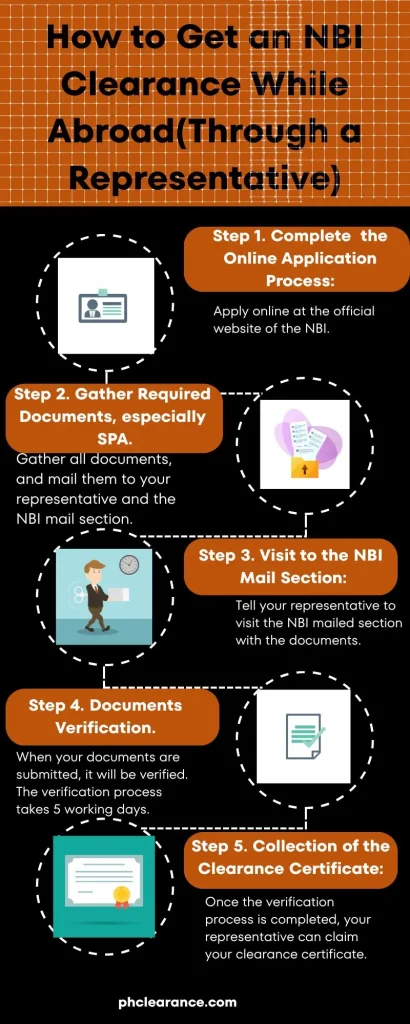
Step 1. Register Online on the NBI Official Website:
Go to the NBI official website and complete the online application process for the NBI clearance.
Follow the steps below to complete the online registration process:
- Go to the NBI official website
- Register yourself with the website.
- Log in to your account.
- Complete your profile.
- Schedule the online appointment.
- Pay the NBI clearance fee.
📄Note: To know about the online application process for the NBI clearance, click here. In this article, we have explained the process in simple words, and have added screenshots for every step. So that you successfully complete the application process on your own from the comfort of your home.
Step 2. Gather all Your Required Documents, Especially the SPA(Special Power of Attorney):
Gather all the required documents and mail them to your representative in the Philippines. Also, mail your documents to the NBI Mailed Clearance Section. ([email protected]).
📄Note: This email is listed on the NBI official website and is used for this purpose. Always verify the contact emails through the official NBI website before sending any documents.
Step 3. Visit to the Mailed Clearance Section:
Tell your representative to visit the NBI’s mailed clearance section. Also, inform your representative to bring all the documents you have mailed.
The mailed clearance section will guide your representative for further instructions and an appointment.
Your representative will need to pay the NBI clearance processing fee if you have not paid the clearance fee.
Step 4. Documents Verification:
The NBI concerned officers will verify your documents. It will take up to a week for the verification of the documents and identification of the applicant.
Step 5. Collection of the NBI Clearance Certificate:
Once your application and documents are verified successfully, your representative can claim your clearance certificate.
Your SPA, photocopy of passport, and original fee receipt must be present with the representative while claiming your NBI clearance certificate.
Once he/she gets the clearance certificate, he/she will mail it to you. When you receive it, put a thumb impression of yourself in the space present for this purpose.
This is how you can get your NBI clearance certificate through a trusted representative when you are abroad.
Method 2: Apply for the NBI Clearance Through a Philippine Embassy or Consulate:
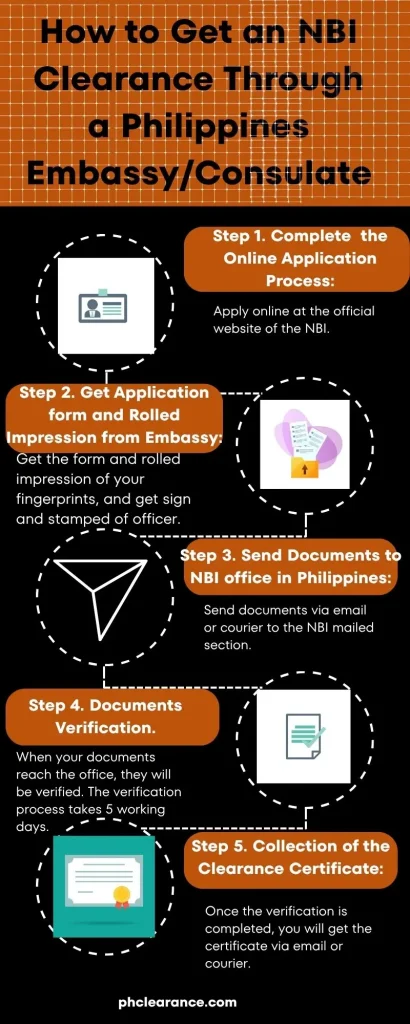
Step 1. Online Registration on the NBI Official Website:
Go to the NBI official website and complete the online registration process, and complete your profile on the website.
📄Note: To know about the online application process for the NBI clearance, click here. In this article, we have explained the process in simple words, and have added screenshots for every step. So that you successfully complete the application process on your own from the comfort of your home.
Step 2. Get the Application Form (Form 5), and Rolled Fingerprints from the Embassy/Consulate or Local Police Station:
Get the form from the Philippines embassy/consulate. Fill out the form correctly. Also get your rolled impression of your fingerprints in front of an officer and get sign and stamp on it from the officer.
Step 3. Send Documents to NBI Office in the Philippines:
Go to a post office or a courier company and send the required documents to the NBI office.
You can also mail the required documents to the NBI Mail Clearance Section, [email protected]. It will take up to 5 working days to verify your documents.
There are 2 channels mainly used to send the documents to the NBI office: through mail(soft copies), or through a post office or a trusted courier service(hard copies).
For email, use the authentic email of the NBI which is [email protected].
For using the post office or a courier service, send the documents to the following address.
Address:
Ms. Sandra P. Sobida
Mailed Clearance Section
3rd Floor, NBI Clearance Building
UN Avenue, Ermita, Manila, Philippines
Trunkline: +63 2 523 8231 loc 5465
Mobile: +63 915 689 3113 / +63 920 122 3327
Email: [email protected]
Step 4. Wait for the Documents Verification:
When your documents reached the NBI office, it will take up to 5 working days for verification.
Step 5. Collection of NBI Clearance Certificate:
Once your documents are verified, the NBI will send you the clearance certificate. When you receive it, put your fingerprint on it in the space provided for it.
Also, check all the details on it. Make sure all the details are correct on the clearance certificate. If there is an error or a missing information, contact the office immediately.
This is how you can get your NBI clearance certificate while abroad.
A personal advice: If you are planning to visit abroad and you have not gotten an NBI clearance. I suggest that you should get an NBI clearance certificate in the Philippines now. Moreover, if you have an NBI clearance ID and you visit abroad. Getting an NBI clearance renewal is easy from abroad.
Special Note for OFWs:
OFWs typically need NBI clearance for job applications, OEC processing, and other POEA-related requirements. Philippine embassies are familiar with this process and can assist with the fingerprinting and certification steps.
Expedited Processing:
The application process for getting a police clearance certificate or the NBI clearance certificate while abroad takes a lot of time.
Check if there are any possibilities to get the clearance quickly if you need it urgently. There may be a process for it, but it will cost you more and come with additional fees for this service.
FAQs:
Conclusion:
Getting a police clearance from abroad may take a little more effort, but it’s very doable with the right steps. Whether you’re an OFW or any Filipino overseas, following the process carefully will help you secure your clearance smoothly and easily.
For the most updated instructions, always contact the Philippine Embassy/Consulate in your area or the official NBI website.
